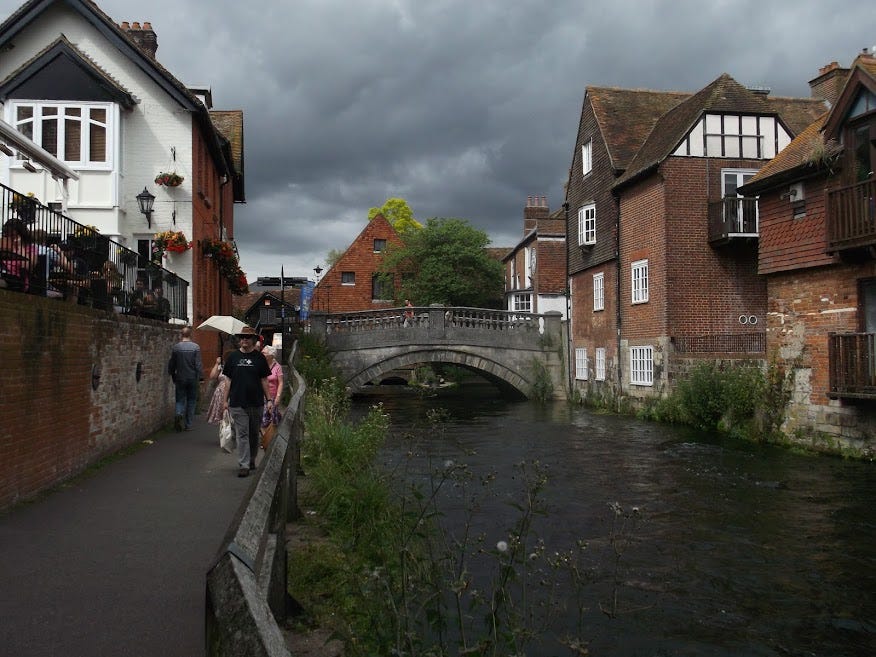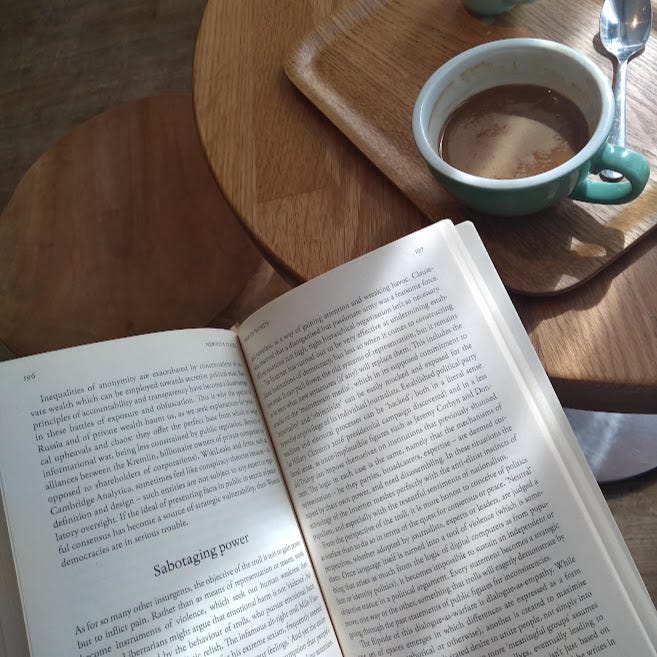I'm just sick of government greenwashing & I want you to know what they're doing
This is kind of a Big Deal.
Help keep the Green Fix running! The newsletter is volunteer-run. If you find this newsletter useful, please consider tipping a virtual coffee.
***
I went home, I think. Not sure. The UK looked the same. Streets led to the same place. Same creaking old beautiful awkward polite arrogant country I remember.
But the supermarket shelves, they lie empty. And the trains - they don’t run much. That wasn’t familiar to me. And the politicians on TV don’t sound like us, don’t think like us, and know that we didn’t vote for them.
This is familiar though. Sitting at a bus stop with a friend in Winchester. Like when we were 15.
We talked about Deep Stuff the way you only do when there isn’t quite time to finish the conversation. About the things we endured during the pandemic. How the long-awaited ‘better’ days of it’ll get better arrived and they arrived without fanfare.
At some point the days of unending crisis turned into just… days that passed. A coffee with a friend here, a day trip there, a momentary panic over work deadlines. A good day. A bad day. Boredom. The ordinary.
My days feel so average sometimes, she said.
Same here, I said. But feelings are not facts.
I’m not here to preach about taking joy in the little things and practising gratitude. I’m not about to say we should feel lucky for existing without constant disaster. We can raise our standards a little bit above the bare minimum for a bearable life.
Not that. But when we from alleged ‘wealthy’ countries struggle to pay heating - when your own governments arrests peaceful protestors for walking -
- when we lived through 2 years indoors and the risk of another two always stalks us-
- when headlines herald the end of days-
- when we are learning to mould our entire lives and careers around securing a liveable planet and undoing the wrongs of our ancestors-
- when we live in the narrow window of feeling both the greatest privileges and quality of life in human history, and suffering the start of the deadly social and planetary consequences of how we got here -
-Who can claim to have an average life?
Passing from moment to moment intact in a state of chronic instability, knowing a fraction of the challenges facing our futures and still making space to be curious about this batshit interesting world around us, to keep heading out the door, making plans, wanting to you know, Do Stuff - you call that average?
Every unremarkable day is a day where the future fails to break your personal tipping points. I call it spectacular. I call it madness. I call it remarkable. I do not call it average. There is no average in the era of extremes.
***
The newsletter is volunteer-run. If you find this newsletter useful, please consider tipping a virtual coffee.
What’s Going On?
Investigation reveals Shell knew about dangers of fossil fuels since the 1970s and covered it up.
Related: New Harvard Law paper suggests charging big oil companies for homicide.The UN has asked world court to issue opinion on government responsibility to protect citizens from climate change.
Related: Meanwhile, 2000 women and a mayor have taken the Swiss and French government to the European Court of Human Rights for climate inaction.Meat corporations and fossil fuel lobbyists watered down the landmark IPCC report.
Related: How major meat companies are lying to you and hiding their climate impact.European banks including Santander and BNP Paribas financing mass deforestation in Paraguay.
Related: Only 20% of 150 most influential financial institutions have any anti-deforestation policies at all.Facing floods, what the world can learn from Bangladesh’s climate solutions.
Related: Climate refugees in Bangladesh struggle as Dhaka literally sinks into the sea.
Focus On… the EU-Mercosur Trade Deal
Friends of the Earth Europe are campaigning to end the worst trade deal of the decade that the EU don’t want you to know about.
“Poison rained down on us for years. We are constantly threatened by the growth of agribusiness.”
Corporations have driven Brazil to environmental tipping point
The people and lands of Brazil are facing a legacy of destruction. Four years of Bolsonaro’s aggressive anti-environmental presidential agenda has sparked skyrocketing levels of deforestation and greenhouse gas emissions, rural conflicts and contemporary slave labour.
Much of this exploitation is driven by major agribusiness who have been allowed to raze the Amazon and indigenous lands to meet the unsustainable levels of market demand.
NGO investigations have found major European supermarkets including Carrefour, Tesco, Sainsburys and Lidl selling chicken, beef, soy and other products linked to suppliers driving human rights violations, carbon emissions and deforestation in South America.
In 2021, 25% of CO2 emissions were linked to the agricultural sector. Almost a third of slave labour cases in Brazil in the last 25 years are linked to the livestock sector.
OK but isn’t Bolsonaro gone now anyway?
Ex-President of Brazil Bolsonaro is gone but the problems are not. In February this year, deforestation in Brazil reached an all-time high. New President Lula has pledged to tackle deforestation but agribusiness holds a very strong influence on the government, holding 25% of the country’s GDP.
On top of this, the European Union is actively propelling demand for more intensive agriculture in the region. This year, the EU hopes to close a free trade agreement with Mercosur (Brazil, Argentina, Paraguay, Uruguay) which would increase the pressure on the region.
What is the EU-Mercosur deal?
In June 2019, the European Union concluded negotiations on a free trade agreement with the Mercosur bloc.
The goal is to cut tariffs on exports from Mercosur - particularly beef, soy, cars and sugarcane, the same products most closely linked to human rights violations, slave labour conditions, deforestation, carbon emissions, illegal landgrabbing and toxic pesticide use.
What will happen if the deal gets ratified?
The deal is predicted to increase the exports of beef by 30%, put Brazil’s emissions at 900 million CO2 tons above what it needs to meet its own climate targets (22 million tons by 2030), and drive Amazon from being a carbon absorber to a carbon emitter (17% of the Amazon is irreversibly degraded and another 20% at severe levels. The tipping point is 20-25%).
On top of this, the deal will weaken food safety checks. Widespread use of toxic pesticides has already had a deadly toll in Brazil: an average of 15 people a day suffered pesticide poisoning between 2010 and 2015, and it has contaminated over 90% of potable water in the country.
Many of these pesticides remain on products exported to the EU, despite most being banned in the bloc.
The deal also legitimises the violation of the rights of indigenous people and affected communities. The UN Declaration on indigenous rights includes the right to “free, prior and informed consent” over matters of their lands. The EU-Mercosur deal modified this to “prior and informed consent,” and respect of this is included as a voluntary measure rather than a binding requirement.
The European Commission’s own Ombudsman found the Commission guilty of maladministration for failing to complete the necessary human rights and sustainability impact assessment before continuing deal negotiations.
What can we do?
Friends of the Earth Europe, as well as over 450 NGOs in both Europe and South America, are campaigning for the EU to drop the deal.
The deal is progressing but controversy is rising: the final draft must be approved by the European Parliament and EU national governments, and several MEPs and country leaders have expressed they will not approve the deal as it stands.
In the latest campaign, Friends of the Earth Europe produced a series of short videos in collaboration with Amigos da Terra Brasil, sharing the testimonies of frontline activists and communities affected by this corporate devastation of the region.
They are also producing a series of factsheets on the impact of agribusiness in Brazil to track and expose the devastation.
People interested in supporting the campaign can share the videos and the factsheets and contact their local MEPs to express their opposition to the deal. WeMove Europe has also launched a petition to this end.
Ultimately, the focus must be - and should always have been - on promoting and supporting a global transition away from intensive agriculture and unsustainable overproduction, towards agroecology and more localised food supply chains.
Find out more about the EU-Mercosur deal on the Friends of the Earth Europe website and follow the campaign via the hashtag #StopEUMercosur on Twitter and LinkedIn.
So Now What Do I Do?
LEARN MORE
Check out the new online course: Capitalism and how we get free.
Read: The earth is not our mother. But the Amazon is a woman.
Read: The case for valuing the wellbeing of future generations.
TRY SOMETHING NEW
Submit your solution for securing universal access to water by 2030 to the One Young World challenge by 17th April to win a grant and mentorship.
UN Climate Champions have launched their latest Youth Fellowship. Apply by 17th April.
Check out the new LinkedIn course on building a career for social impact.
CHANGE THE SYSTEM
UK: Join over 70 NGOs, the NHS and XR for a four-day peaceful protest outside the Houses of Parliament. 21st - 24th April.
Apply to be on the Youth Sounding Board of the EU’s external policy service by the 26th April.
The UN Environment Programme has launched a talent pipeline with 12 new volunteer assignments. Deadline 15th May.
Free Fashion Revolution Week event / 29 April / Brussels!
We care about what you wear! Yes, you read that right, and we think that you should care too! Why? Well, join us for a free event at the Lokal store to find out! Come, have a drink and join our discussions. Find out what it means to care about fashion and how you can use your citizen voice to help change the industry. Claim a spot here.
(Note from Cass: I’ll be there in the morning discussion - come say hi!).
The Green Fix offers low-cost sponsored slots on the newsletter. Book your slot by emailing wearethegreenfix@gmail.com.
Stay in the loop
You can also follow the Green Fix Twitter and LinkedIn page here for more climate opportunities. You can connect with Cass on Instagram, Twitter and LinkedIn.







